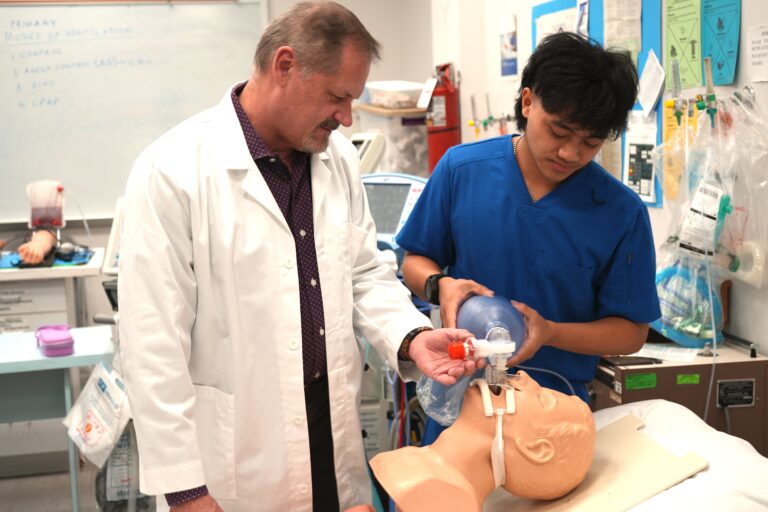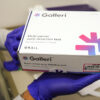A new lung clinic in Halifax aims to slash years-long wait times for basic breathing tests and strengthen Nova Scotia’s respiratory therapy workforce.
Announced on Thursday, the Nova Scotia Lung Wellness Clinic will open at the end of November after more than two years of planning. Its creators designed it to serve patients faster while giving respiratory therapy students at Dalhousie University the hands-on training they need to graduate.
The idea emerged during the COVID-19 pandemic. People in parts of the province faced waits as long as four years for a five-minute spirometry test. Local researchers viewed that delay as unacceptable. They noted that most countries deliver such tests within days or weeks. One Dalhousie epidemiologist said the backlog embarrassed specialists because the fix seemed straightforward.
The clinic’s model relies on supervised student labour. Respiratory therapy students will administer the tests while a Nova Scotia Health preceptor oversees their work. The approach gives students real clinical time, which is mandatory in their program. It also clears the queue of patients who have waited years for essential diagnostic care.
Spirometry plays a core role in diagnosing asthma and chronic obstructive pulmonary disease (COPD). Roughly 13 per cent of Nova Scotians live with COPD. However, doctors often misdiagnose the illness when spirometry is not available.
Clinicians compared the delay to making a diabetic wait years for a standard blood test. They warned that patients may receive medications that do not help them and sometimes harm them. Accurate tests, they argued, give doctors the information they need to treat people properly.
Read more: Breath Diagnostics takes aim at lung cancer with One Breath
Read more: Lung cancer awareness month: a Mugglehead roundup
Streamlined process to improve wait times
The Lung Association of Nova Scotia and P.E.I., Nova Scotia Health, and the provincial Health Department formed a partnership to run the pilot. GSK Canada, part of GSK plc (NYSE: GSK), funded the project with a CAD$300,000 contribution. The companies and agencies said the program shows how the system can work with industry to support better care. The pilot will operate for 18 months.
Dalhousie’s school of health sciences oversees the education component. Its director expects the clinic to remove a few hundred people from the backlog each month. She said the streamlined process will improve wait times while giving trainees consistent practice. She added that students will learn in a safe environment at a steady pace. The setting resembles hospital life but offers more time to develop skills.
The clinic also hopes to address severe staffing shortages. Nova Scotia Health currently lists 37 full-time vacancies for respiratory therapists, which equals about 20 per cent of its staffing need. That number does not include openings at the IWK, in long-term care, or in private clinics. The shortage has persisted for years.
Dalhousie doubled enrolment in its respiratory therapy program two years ago, accepting 24 students annually. However, the university then struggled to place students in Nova Scotia hospitals. Many had to travel to other provinces for clinical experience. Some stayed and accepted jobs elsewhere. The new clinic should help keep trainees in the province by ensuring they can complete their placements closer to home.
Read more: Breath Diagnostics opens Respiratory Innovation Summit with captivating presentation
Read more: Breath Diagnostics leader speaks at lung cancer education event in Louisville
New tech opens new avenues to getting around barriers to care
The clinic has begun contacting patients who have waited longest. Many live in the Western Zone, and staff are checking whether they can travel to Halifax for testing. The team plans to work through the backlog first. Afterwards, they hope to open appointments to primary-care referrals. They also plan to explore self-referral options for people without family physicians.
Staff said the clinic represents an innovative local solution. They believe it will improve patient access, expand training opportunities and strengthen the broader care system. They also view the project as a chance to reshape respiratory care in Nova Scotia for years to come.
New respiratory diagnostic technologies are opening new avenues to overcome long-standing barriers to care, particularly long wait times, lost work hours, and risks associated with conventional testing. Many Canadians face delays in receiving basic tests like spirometry, partly because they must take time off work, book scarce appointments, and wait weeks or months for testing. These barriers slow the diagnosis of conditions such as asthma and COPD and contribute to persistent backlogs.
In lung cancer, low-dose CT scans are currently the standard screening tool but involve exposure to radiation and can lead to false positives, follow-up procedures, and patient anxiety. Emerging technologies offer safer, faster alternatives. One example is OneBreath from Breath Diagnostics, which analyzes volatile organic compounds in a patient’s breath. This approach can detect lung cancer with high sensitivity and specificity without radiation or invasive procedures.
For COPD and asthma, non-invasive breath-biomarker tests are being explored. “Electronic nose” sensors can analyze exhaled compounds to distinguish among different lung conditions. Other promising options include sputum-based biomarker panels, saliva tests, and molecular markers that may allow earlier detection.














